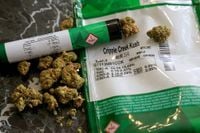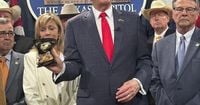On June 22, 2025, Texas Governor Greg Abbott vetoed Senate Bill 3, a sweeping proposal that would have banned virtually all consumable hemp products containing THC, the psychoactive compound found in cannabis. The veto came just minutes before the midnight deadline, sparking immediate reactions across the political and business spectrum and setting the stage for a special legislative session to tackle the thorny issue of THC regulation in the state.
Senate Bill 3, championed by Lieutenant Governor Dan Patrick and backed by a majority of Republicans in the Texas legislature, sought to impose one of the most restrictive bans on THC consumables in the country. The bill aimed to criminalize the possession, sale, and manufacture of THC-infused products such as gummies, vapes, and beverages, which have flourished in Texas since a 2019 state law legalized hemp with trace amounts of delta-9 THC. Supporters of the ban argued the market was dangerously under-regulated, allowing products with high THC concentrations to be sold without age restrictions or adequate testing, potentially exposing children and vulnerable populations to harm.
However, Governor Abbott struck down the bill, calling it unconstitutional and warning that it would clash with federal law. "Passing a law is not the same thing as actually solving a problem," Abbott stated in his veto proclamation. He emphasized that the bill would face "valid constitutional challenges" and likely be tied up in litigation for years, delaying any meaningful regulation. Abbott also highlighted the unintended consequences of the bill, which could criminalize farmers, pharmacists, veterans, and parents who have legally invested in the hemp industry and rely on hemp-based THC products for medical purposes.
Abbott’s veto preserved an $8 billion industry that supports approximately 55,000 jobs across Texas. The governor called for a special legislative session beginning July 21, 2025, tasking lawmakers with crafting a regulatory framework that balances public safety with economic vitality. He recommended considering a regulatory model similar to the state's three-tier system for alcohol, including age limits, testing requirements, manufacturing restrictions, and bans on public consumption or open containers of THC products. Abbott stressed the need for a "fully funded enforcement structure" that could take effect without delay, warning that the current market’s lack of regulation was putting children at risk.
Lieutenant Governor Dan Patrick, a vocal advocate for the ban, responded sharply to Abbott’s veto. On social media, Patrick criticized the governor for remaining "totally silent" throughout the legislative session and expressed his disappointment that the veto left law enforcement, medical professionals, educators, and families feeling "abandoned." Patrick promised to hold a press conference on June 24, 2025, to further address the issue. He has long described THC-infused products as a "poison in our public," emphasizing the dangers posed by high-potency consumables, especially to minors.
The debate over Senate Bill 3 reflects the complexities of regulating hemp-derived THC products in Texas. The 2019 state law that legalized hemp farming and commercialization set a limit of 0.3% delta-9 THC by weight but did not impose potency limits on other hemp derivatives such as delta-8 THC. This loophole allowed a burgeoning market of over 8,000 retailers to sell a wide range of THC-laced consumables, from edibles to vapes and smokable flower buds, without the strict oversight seen in other states. Texas currently lacks age restrictions, packaging regulations, and mandatory testing, creating a patchwork market where consumers and law enforcement alike face uncertainty.
Opponents of the ban, including many veterans and patients with chronic pain or epilepsy, argue that hemp-based THC products provide affordable and accessible relief not available through the state’s limited medical marijuana program. Veterans, in particular, have voiced frustration that the program’s narrow qualifying conditions and high costs exclude many who benefit from hemp-derived products. The Texas Hemp Business Council praised Abbott’s veto, calling it a demonstration of "real leadership" and expressing readiness to collaborate with lawmakers on sensible regulations that protect consumers and children while preserving economic growth.
Law enforcement agencies have also highlighted challenges in policing the current market. Recent raids, such as a massive seizure of over 75,000 pounds of THC products in Dallas with THC concentrations far exceeding legal limits, underline concerns about product safety and illegal sales. Yet, a total ban risks criminalizing innocent individuals and businesses operating within the existing legal framework, a concern Abbott underscored in his veto message.
As the special session approaches, lawmakers face the difficult task of balancing competing interests: public health and safety, economic development, legal clarity, and the needs of patients relying on hemp-based THC. Proposals under consideration include regulating the industry under the Texas Alcoholic Beverage Commission, instituting age limits (likely 21 and over), restricting sales near schools and churches, and enforcing truth-in-labeling standards to prevent misleading marketing aimed at minors.
The veto also echoes similar political dynamics seen in other states. Notably, Florida Governor Ron DeSantis vetoed comparable legislation last year, citing concerns about the impact on small businesses. Texas’ approach will be closely watched as it navigates the tension between prohibitionist policies and regulatory frameworks that acknowledge the realities of hemp-derived THC markets.
Governor Abbott’s decision underscores a pragmatic approach: rejecting outright bans that may falter in courts and instead pushing for enforceable, nuanced regulation that can be implemented swiftly. Whether the legislature can deliver a balanced, effective framework remains to be seen, but the stakes are high for thousands of businesses, consumers, and families across Texas.
As Abbott himself put it, "We can do better. Texas must enact a regulatory framework that protects public safety, aligns with federal law, has a fully funded enforcement structure, and can take effect without delay." The coming weeks will reveal if Texas lawmakers can rise to that challenge.






